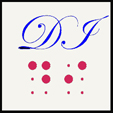Current Projects
The Hebrew Braille Sefer Torah
Jewish blind people and those with visual impairments, in the majority of communities, have not been given the opportunity to participate as a reader in a Sefer Torah congregational service. This had been the case for millennia. Although the statement would seem self-evident, the modern invention of Hebrew braille has placed a new context on this topic.
How people with disabilities fit within the Jewish community has been debated for thousands of years. The general view is that the blind and the visually impaired should be considered full members of the community but restrictions applied by to the blind and visually impaired has led to less than full acceptance.
The majority of the customs for the creation of a sefer Torah were promulgated in the eighth century and printed in the text Masekhet Soferim. Braille did not yet exist. Judaism has always adapted the application of its precepts based on context - time and location. Today we have the ability to create a braille Sefer scroll and thereby include this segment of Jews in a congregational Torah reading. This includes those that wish a bar or bat mitzvah or an aliya as part of the weekly synagogue reading.
We have created a kosher braille scroll whoch meets all major characteristics as defined by previous generations. The cost to create the scroll is quite extensive. It is unlikely that most congregations will fund their own scroll. Devarim Institute has decided to create a number of scrolls and let those that wish around the country to borrow them for their torah reading. In this way you only have to pay for the shipping costs. We have even supplied a shipping container that can be reused, so you do not need to be concerned about how to ship the scroll back.
In addition we will supply study tools to allow you to practice the portion you will be doing. We will preroll the scroll to the portion you wish and work with you to make this whole process easy and straight forward.
The creation of braille Sefer Torahs will potentially affect hundreds of thousands of Jews nationwide and potentially worldwide.
For details about borrowing these scrolls please contact Rabbi Sarko on the contact link.
Hebrew Braille Course
There are more than 400,000 blind and/or visually impaired Jewish people in the United States. Although there are many organizations that teach English braille, there are none that teach Hebrew braille that we are aware of.
As an augment to the Hebrew Braille Sefer Torah, a need arose to teach Hebrew braille, so those who are blind or visually impaired can use the scrolls. Devarim Institute has creating a home learning program, that will teach Hebrew braille.
The program allows the learner to go at their own page and learn at home. We will send a set of workbooks. Each set will have a braille version and a text version. The braille version will be in both English and Hebrew braille. The learner will need to know how to read uncontracted English braille to do this course.
The text version is in English and contains pictures of the material to be learned. In this way the local helper of the student does not need to know Hebrew or Braille.
There is no cost to obtain this course!
For more information please contact Rabbi Sarko with the information on the contact page.
Refreshable Braille Mishkan Tfilah
The Federal government through the National Library System, began a program to provide free refreshable braille devices to the blind and visually impaired. It is currently operating in forty states and will be rolled out the remainder shortly. This provided an opportunity to place a denominational prayerbook on a portable device which is small, about 3"x 7"x 1" and weighs less than a pound. An entire prayerbook can be placed on it. The device was designed for reading books, line by line. Jewish services use of prayerbooks tend to skip around. Rabbi Sarko took the time to develop computer coding to place onto a refreshable braille file to allow use as it is needed within a service. The Mishkan Tefila Reform Prayerbook is currently available and we hope the remainder of the denominational prayerbooks will soon follow.
There is no cost to obtain the Refreshable braille file of the Reform prayerbook for Shabbat Mishkan Tfilah!
For more information please contact Rabbi Sarko through the contact page.
